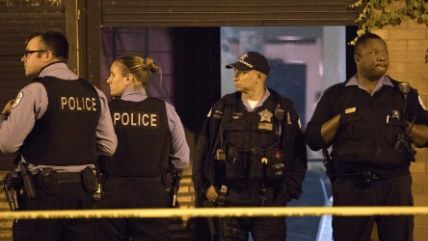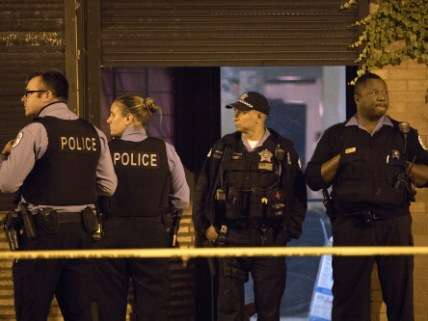Chicago Police to Speed Up Body Camera Adoption, Assuming Officers Don't Sabotage Them
Also keep an eye out for foot-dragging on releasing footage of controversial calls.


Today the City of Chicago is set to announce that it's speeding up the adoption of body cameras on every patrolling police officer. Originally they had planned to get everybody cameras by the end of 2018. Now they're planning to roll it all out by the end of next year.
Currently officers in a third of Chicago's 22 police districts have body cameras. Given Chicago's reputation as having the most corrupt, abusive law enforcement system in any major city, the idea of them implementing body cameras more quickly seems like good news on the surface.
But as we're learning with police and body cameras, the devil is in the details, and what happens after the body cameras actually come into play matters. As a reminder consider everything surrounding the case of Chicago Police Officer Jason Van Dyke fatally shooting Laquan McDonald back in 2014. The shooting was captured on a police dash camera, but the city sat on the video and wouldn't publicly release it for a year until ordered to do so by a judge, coincidentally around the time Van Dyke was finally charged with murder.
Even then, there was a lot of footage of the incident missing. The dash cameras of several police cars on the scene were not working and the video footage that was released lacked any audio. And according to internal reviews of the police department this was likely a result of "intentional damage" caused by the officers themselves. After administration cracked down on officers to make sure they were following procedures properly, Chicago Police saw a 70 percent increase in the amount of camera footage uploaded each shift.
That's all a reminder that all the video equipment in the world won't matter when police are not held accountable for ignoring policies (the crackdown here happened only after they discovered all the problems with footage in the McDonald case) and when the city itself deliberately avoids transparency in situations of controversy about police behavior.
Note that the National Fraternal Order of Police is encouraging President-Elect Donald Trump to "de-prioritize" implementation of many of the recommendations listed by President Barack Obama's Task Force on 21st Century Policing. Increased implementation of body cameras by law enforcement agencies across the country is one of the items on the list.
Trump shouldn't have any authority one way or another over whether municipal police implement body cameras (neither does Obama). But the Department of Justice began offering grants to help police pay for them in 2015. A Trump administration could eliminate such grants. (Note: We shouldn't necessarily support federal funding for body cameras, which encourage companies to jack up the prices to get more of the money. But it is a consequence that will probably slow implementation in some places.)


Show Comments (14)